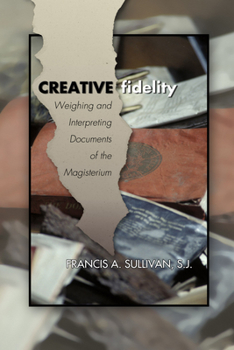Creative Fidelity
Select Format
Select Condition 
Book Overview
An important part of the theologians' task is to make the church's dogmas meaningful to the faithful of their own time. The attitude with which a theologian should undertake this task of communicating a contemporary understanding of the faith is well described as one of creative fidelity. Two basic sources for Catholic theology are scripture and the documents of the Magisterium. Just as Catholic theologians must know how to distinguish among the various literary genres in the bible and how to interpret scriptural texts, they must also know how to determine the relative degree of authority exercised in the various documents issued by popes or councils and how to apply the principles of hermeneutics in interpreting them. This book offers guidelines that will help those interested in Catholic theology to make sound judgments about the authority and meaning of the documents in which the church has expressed its faith over the centuries. Making such judgments requires a knowledge of the correct level of response these documents call for from the faithful and the ability to offer to today's faithful a contemporary understanding of their faith. The task of the interpreter is one of creative fidelity, requiring a delicate balance between being faithful to the original meaning of the text and creative in finding the concepts and terms that make it meaningful today.
Format:Paperback
Language:English
ISBN:1592442080
ISBN13:9781592442089
Release Date:March 2003
Publisher:Wipf & Stock Publishers
Length:218 Pages
Weight:0.70 lbs.
Dimensions:0.5" x 6.3" x 8.7"
Customer Reviews
1 rating
levels of authority, degrees of adherence
Published by Thriftbooks.com User , 22 years ago
"If you knew the gift of God and who is saying to you, 'Give me a drink,' you would have asked him and he would have given you living water."--Jn. 4:10What is this gift of God, the revelation of God? No simple answer, not least of all for Catholics, who believe in faith that the revelation of God springs from the threefold origin of scripture, tradition, and magisterium. Fr. Francis A. Sullivan, S.J. brings a fine, discerning intellect to bear on the question of the magisterium. With 36 years' grist of teaching experience at the venerable Gregorian University, Fr. Sullivan draws key distinctions that manifestly reject the excesses of the conservatives, for whom every declaration of the magisterium is to be accepted without question, as well as of the liberals, for whom every aspect of the magisterium that is not set forth as infallible dogma is to be contested and, for all practical purposes, discarded. In order to define the different levels of authority by which doctrines are set forth as well as the varying degrees of adherence required, Fr. Sullivan uses as his framework the new Formula for the Profession of Faith that in 1989 was required as an oath for all those who assume a responsible position in the Church. According to this formula, there are three kinds of doctrine: dogma infallibly or definitively taught, pertaining to the depositum fidei, which requires an act of faith; truths infallibly or definitively taught, pertaining indirectly to the deposit of faith, which must be firmly accepted and held; and non-definitive teachings of the Pope and the Bishops when they exercise their authoritative magisterium, which obliges the religious submission of will and intellect. As in many instances throughout the book, Fr. Sullivan makes the following all-important distinction concerning religious submission to non-definitive teachings....The essential difference between "assent" and an attitude of willingness to accept the magisterium is that assent is an "either-or" proposition; one either gives one's assent or one does not. On the other hand, an attitude of willingness admits of varying degrees (p. 24).I believe that any Catholic who wishes to genuinely understand the meaning of the term "magisterium," and, as a corollary, Church teaching, would benefit greatly from Fr. Sullivan's exposition.Apt historical examples elucidate rather abstract ideas. To illustrate different degrees of dogmatic weight, for instance, Fr. Sullivan discusses three distinct Marian doctrines. The first is the virginal conception of Jesus, which has a clear basis in scripture and is consistent with Christian belief and Church teaching from earliest times. He says it is an instance of an infallible dogma taught by the ordinary and universal magisterium. The second doctrine is the perpetual virginity of Mary, which is not found in scripture although conciliar and papal documents witness to constant and universal belief. This, Fr. Sullivan opines, is a dogma but undefined.





